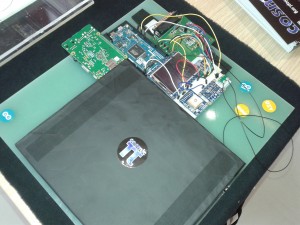Cosmic Pi and You!
Let's talk about our relationship with you, as a user or potential user!
Firstly, who is a user? For us it's someone who either contributes or downloads our cosmic ray data, either for scientific use or just general interest. We'll now look at some use cases, which will be relevant depending upon what you plan to do in relation to Cosmic Pi:
I like Cosmic Pi on Facebook...
Right now this is one of the ways you can follow our progress. We'll keep you up to date with the latest progress on development. Everyone who likes the page can also comment and post things, which we will moderate before publication. We will only post news, stories and information related to Cosmic Pi, physics, Raspberry Pi, Arduino and other electronics or computing things we consider relevant.
You can find our Facebook page here: https://www.facebook.com/cosmicpi
I'm following you on Twitter...
This is another way you can follow our progress. We'll also share tweets from other relevant people and organisation in the general science/citizen science/electronics and related spheres.
You can follow us here: https://twitter.com/cosmicpi
I just joined your Cosmic Pi mailing list!
Thank you, we'll notify you whenever we post an article on our blog or have something Cosmic Pi related to tell you. The only information we hold about you is your name (if you told us) and your email address. Sending to the list is exclusively controlled by us, with your names and email addresses hashed to protect them in case they fall into the wrong hands. If you want to un-subscribe please click on the link in one of the emails.
Subscriptions to the list can be made here: http://cosmicpi.org/
I just joined your Cosmic Pi Open Hardware Repository mailing list (for advanced users!).
The Open Hardware mailing list is for those interested in software or electronics development. It's the place to share deeply technical information or questions. We will moderate the discussion to restrict things which are off-topic, or otherwise inappropriate. If you want to make technical comments or suggestions we welcome your participation with enthusiasm and we will do our best to ensure the discussion remains positive.
The list can be found here: http://www.ohwr.org/projects/cosmic-pi
If I have a Cosmic Pi, what data will I be sharing with the world?
We'll have a very simple registration scheme for Cosmic Pi's that people want to connect to our network. If you don't want to share your data, there's no obligation to do anything by way of registration, but you'll be missing out on the most exciting part of the project.
Registration will require entering your unique device reference. You will also need to connect it to your network, via entering your Wi-Fi network name and access code, which will be stored locally on the Raspberry Pi. Once this is done we'll be ready to receive your cosmic ray data and share it.
At the moment, our Cosmic Pi hardware design is going to log the following data under a Creative Commons CC0 license:
1) Cosmic Rays (and the energy deposited in the scintillator slab)
2) Precise space and time information via GPS for each cosmic ray event, including the position of your receiver.
3) Temperature, Humidity, Air Pressure, Seismic vibrations (acceleration), Magnetic field strength, and the status of the other detector related electronic hardware
4) A unique reference to identify each detector (if you build your own let us know and we'll give you one)
5) Status information about your Raspberry Pi to ensure everything is working correctly
6) Indirectly, we'll also know your IP address because you are sending the information to us over the internet
We'll be storing all this data on our servers and making it accessible to the world. Once your device is set up, you can use the unique reference (or just the map!) to locate it on our website and check it's performing correctly. We're also thinking about adding an alerts service, where you could register for email status updates about your device, but this is still an idea at the moment.
Anyone looking at the data will be able to see where the Cosmic Pi's are in the world, so if you have one in your home it will be visible on the map - of course we're not going to tell anyone who it belongs to, either directly or indirectly, but you should be aware that potentially everyone can see it via our map. Likewise if you decide to install one in your car or keep it turned on in your backpack all day, your movements will be visible as it picks up cosmic rays and sends them to our server whilst you move around. If for whatever reason you don't want the location of your detector to be published, then we can't use your data to study the location of ray showers - because we, and everyone else looking at the data, will need spatial information to do the analysis. We haven't found a simple way around this problem yet, so for now we suggest that those who are uncomfortable sharing the location of their detector don't connect it to our server.
How can I tell if it's genuine?
Simply look for the Cosmic Pi logo. We've registered it as a trademark, so only we have the right to sell Cosmic Pi branded scientific instruments from the UK. If it comes from somewhere else, or doesn't have our logo on it then it's a fake. Of course our design is open hardware, so anyone can make it - but they have to call it a different name. We're happy to talk with anyone who wants to build our design, but the name is our property.
What about money?
We'll be launching a crowdfunding campaign through a reputable portal later this year (2016), this is the only time we're ever going to be asking for your money. If someone else is asking for money for a Cosmic Pi through some other way, it isn't us. Please let us know if this happens to you so we can warn the rest of the community.
How long will my Cosmic Pi last?
Like all physical objects, it depends on how you treat it! If you take good care of it, by keeping it at a stable temperature (5-35 Degrees) in a reasonably dry environment (not outside, or in the bathroom!), out of direct sunlight, then it should last at least 5 years. We're planning to run and maintain the servers for a 5 year period, subject to success in our crowdfunding campaign. As a standalone detector there is no particular limit on the lifetime of your unit.
Other questions you might have:
Why are you emailing/calling/messaging me and asking for my credit card number? We're never going to ask for your credit card details (or your passwords or other personal information), if someone is asking for this information on behalf of Cosmic Pi they're an imposter. Please let us know so we can warn the rest of the community.
Data that we don't want!
Here are some things that Cosmic Pi will never ask you, because we care about cosmic rays and citizen science, rather than who you are:
Age, gender, sexual orientation, race, gross income, postal address, fixed or mobile telephone number, credit card number, social security number, or indeed any information beyond what we need for scientific analysis. In the future we might ask you for an email address when registering your device so that we can contact you in the event of a technical problem, but we're still working on that.
And finally...
We are all scientists and engineers, with full time day-jobs. Cosmic Pi is a citizen science project we're running in our spare time, we're doing our best so we also ask for your patience and understanding if we're not able to get back to you instantly. We take the security of your data and our community seriously, and through things like this post we want to show everyone where we stand on this issue. Our philosophy is to be as open as possible, with our hardware, software, aspirations for the project - and our relationship with you, our fans and users.
Team Cosmic Pi

